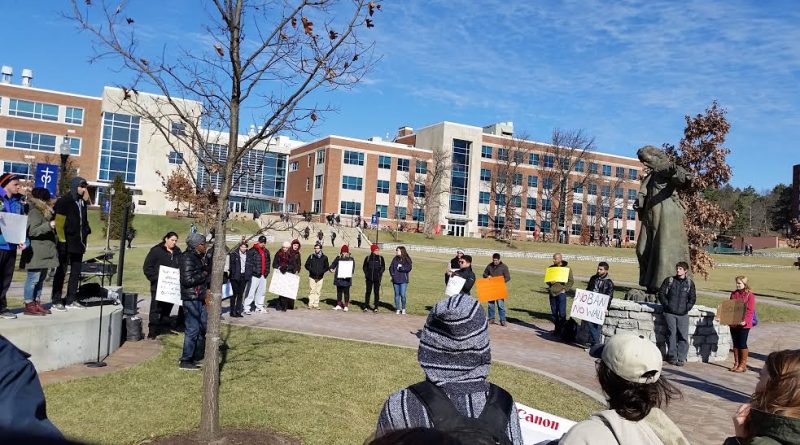UD community protests against immigration ban
By: Julia Hall, Online Editor-in-Chief
A biting breeze flustered posters that displayed inked phrases such as “All are Welcome Here” and “No Ban. No Wall.”
A circle of students, faculty and staff gathered in front of Kennedy Union on Feb. 2 to vocalize their distaste with the immigration ban by an executive order signed by President Donald Trump.
The protest occurred just days after the ink met paper.
On Jan. 27, the White House released a document that contained an executive order halting immigration from seven countries: Iraq, Syria, Iran, Sudan, Libya, Somalia and Yemen.
The order intended to “suspend entry into the United States, as immigrants and nonimmigrants, of such persons for 90 days from the date of this order (excluding those foreign nationals traveling on diplomatic visas, North Atlantic Treaty Organization visas, C-2 visas for travel to the United Nations, and G-1, G-2, G-3, and G-4 visas).”
While the status of this ban is currently in flux, with judicial arguments and retorting appeals occurring these past few days, the ambiguity of the future also touches those living in this country with a student visas.
The University of Dayton is home to several students directly affected by this ban, and, yes, they too live in uncertainty.
In an email sent by President Eric Spina to the UD community, he wrote, “We have approximately 45 students, faculty, and staff from the affected countries.”
In reaction to the executive order, UD student fifth-year Rob Alexander took action. While he was not one of the students directly affected by the ban, he organized a protest with students and staff who were affected, in addition to those who wanted to stand in solidarity.
Present at the UD protest, Hebeeb Alasadi, a graduate mechanical engineering student from Iraq, stepped up to the microphone to discuss his experience as a student immigrant. Other students affected by the ban joined Alasadi in sharing their narratives.
President Spina made a statement at the protest.
He said, “I am Eric Spina, and I am here as an individual. I am part of the faculty here.” A slight chuckle from the crowd resulted. He continued, “I am the grandson of four immigrants. I understand this country was built, is still built, on immigrants in this country. I can understand the richness and diversity that all people bring to this country and bring to this campus.”
Post-protest, Alasadi agreed to sit down with Flyer News. After insisting on treating FN to coffee (which unluckily spilled), he shared his personal story.
Alasadi is not only a master’s student, but also is a father of five children between the ages of six months and 12 years. Alasadi has a dream: earn his PhD in the United States. The ban deems it impossible for him to achieve this goal.
Alasadi and his family have been living here since May 2014, and after he graduates this upcoming spring, they will have to return home, unable to return to the US if the ban is not overturned.
“Before this night, I was happy. Before this night, I said the days were like hours and the months were like days and the years were like months. But on this night, that changed. I said, OK, I only just have three months until I graduate. This past month was like three years,” Alasadi reflected on the night he learned of Trump’s executive order.
Turning to his life in Dayton, he told a story of a teacher and her husband who visited his home every Saturday to aid in teaching his wife English. In another, the teachers at his children’s school hug them and welcome them.
Subsequently, he states, “When I just flip the news, I see the executive order means ‘you are not welcome’.”
“The people from the UD said, ‘We support you. We stand with you. You are OK. Do not worry about it. Do not think about it.’ So, that is what happens from friends. They said, ‘We know. We are sorry,’ even though it is not their fault,” Alasadi said.
“So, I told you, my first time in USA, I knew that they had a great, great army, but now I see that they have great people, greater than their army,” Alasadi concluded. “I see people open their arms to us, while the government crosses them.”
Photo Courtesy of Bradley Petrella

